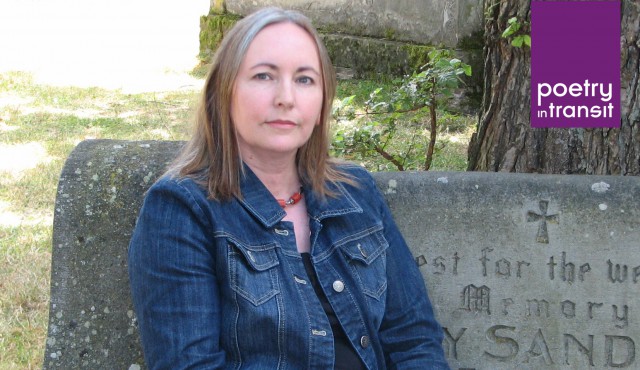Poetry in Transit interview with Catherine Greenwood
Poetry in Transit interview with Catherine Greenwood

Poetry in Transit, now in its 18th year, aims to profile talented British Columbian and Canadian poets and provide our customers with poetry to read on their commutes.
An excerpt from Catherine Greenwood’s “Charity” from her book, The Lost Letters, is one of 20 poems on the system this year – 10 poetry car cards on buses and 10 transit shelter ads. She took time out of her busy schedule to answer a few questions from me about her poem and herself!
Who is Catherine Greenwood?
Wife, cat-wrangler, paper-pusher, collector of hotel soaps, reader of gothic novels, belated-birthday card sender. I live in Esquimalt and work for the Ministry of Justice.Would you be able to tell us a bit more about “Charity?” What were the inspirations behind it?
I was working in a community services thrift store when someone I’d known in elementary school walked in, needing a coat The bus card titled “Charity” is an excerpt from a longer poem about this encounter on the theme of the return, with its attendant questions of recognition, as in the biblical story of the prodigal son or the return of Odysseus from his long journey. There’s a loose pattern of end rhyme — returns in a technical sense — and alliterative meter throughout. It seemed fitting to use archaic style in piece that felt like a fairytale.How would you classify your style of poetry and writing? What inspires you?
I write narrative poems in varying styles. I don’t usually set out to achieve a particular form but my poems often end up in a shape fitted to each particular piece, eleven-line stanzas for example, sometimes with end rhyme, almost always with metaphors and internal sound effects.What’s a ‘great’ poem for you?
I’m going to quote my answer to this question from another interview, because it still holds for me: “A great poem is affecting, stirs something up in the reader, yields new dimensions and revelations on successive readings, yet retains its essential mystery.”Who’s your favourite poet and/or somebody that has heavily influenced your work?
I absorb many influences. In my most recent book, The Lost Letters, there is an animal section that may echo British nature poet Jeremy Reid; a section about Heloise and Aberlard that intentionally adopts a particular metaphor-saturated voice inspired by American poet Amy Gerstler’s work; I also had Stephen Mitchell’s translations of Rilke in mind while writing some of the other poems. I can’t choose a favourite poet.What does Poetry in Transit mean for you?
A poem from my first book The Pearl King and Other Poems was on Poetry in Transit, and there’s a lovely story about that – apparently the poem, “Exile”, a very short love poem about the pain of being separated, sparked a conversation between a couple of strangers who ended up getting married and having the poem read at their wedding. Perhaps someone reading “Charity” might be spurred to consider what lies beneath a person’s appearance – if it generates a moment of contemplation or empathy in a commuter or two, that would be an unintended but nice consequence of having the poem shared so widely.Do you take transit? If so, what’s your favourite mode?
I take the bus to work every day, and I have done so for over thirty years, from different residences to different jobs. I’ve come to know some of my fellow commuters as well as I know my co-workers. When I’ve had to drive, I’ve found parking expensive and a nuisance, and then in winter there’s warming up the car in the morning and scraping off frost –who has time for that? My husband and I went a couple of years without a car in our current location, and I realize that I prefer to live in an area with public transit. It’s liberating.Peer into your crystal ball, and tell us what you see for yourself in the future.
Fiction is in my future. I have a big, back-burnered project I’m psyching myself up to return to working on. Hopefully some travel around BC related to that project, and very likely a trip to England and France in springtime with my husband. It’s a time of transition and change, which is challenging but exciting.
Thanks for your time Catherine and we look forward to reading more of your work! Join the Poetry in Transit conversation on Twitter using the hashtag #PoetryInTransit.
Author: Allen Tung





